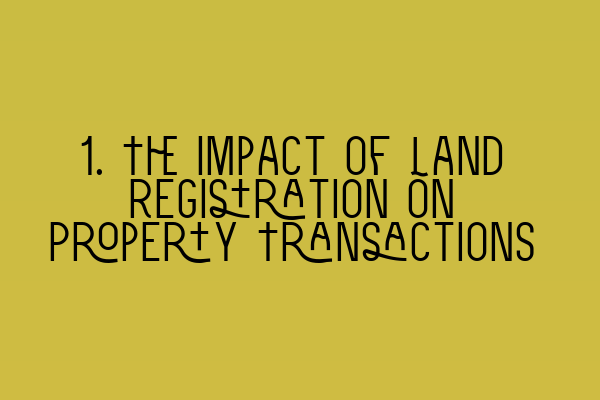At SQE Property Law & Land Law, we understand the importance of land registration in property transactions. Land registration is a fundamental aspect of property law that provides legal certainty and protection to both buyers and sellers.
What is Land Registration?
Land registration is the process of officially recording details of a property’s ownership, boundaries, and registered interests in a public register known as the Land Registry. The Land Registry maintains an up-to-date record of all registered properties in England and Wales.
Prior to the introduction of land registration, property ownership was often established through the use of deeds and other written documents. This system had its limitations, as it relied heavily on the accuracy and preservation of paper records, which were prone to loss, damage, and disputes.
Land registration aims to overcome these limitations by creating a centralized and reliable system for documenting and verifying property ownership. When a property is registered, the Land Registry issues a unique title number and creates an official register that contains all relevant details about the property.
The Benefits of Land Registration
Land registration offers various benefits to property owners and potential buyers:
- Legal Certainty: Land registration provides clarity and certainty regarding property ownership and boundaries. It ensures that registered owners have a legal title to the property and are protected against adverse claims.
- Protection of Interests: Land registration allows for the registration of various interests and rights related to a property, such as mortgages, leases, and easements. These registered interests are protected and enforceable against third parties.
- Evidence of Title: The registered title acts as conclusive evidence of ownership and eliminates the need for extensive property investigations. This simplifies property transactions and reduces the risk of disputes.
- Public Notice: The land register is publicly accessible, allowing interested parties to view the registered details of a property. This facilitates transparency and prevents fraudulent transactions.
- Indemnity Protection: The Land Registry provides a unique system of indemnity where it guarantees compensation for any loss suffered due to errors or omissions in the register.
The Impact on Property Transactions
Land registration has significantly influenced property transactions, simplifying the process and providing greater security for buyers and lenders:
- Ease of Conveyancing: Land registration has made conveyancing more straightforward and efficient. The registered title provides comprehensive information about a property, reducing the need for detailed investigations and documentation.
- Mortgage Lending: Lenders require land registration to validate the ownership and value of a property before providing a mortgage. The register provides a reliable source of information for lenders and helps in assessing risks associated with the property.
- Consumer Protection: Land registration offers a level of consumer protection by ensuring that the buyer’s interest in the property is properly registered and protected.
- Dispute Resolution: Land registration minimizes the risk of boundary disputes and other conflicts by clearly defining property boundaries and ownership.
Overall, land registration plays a crucial role in property transactions, providing certainty, protection, and efficiency. It has revolutionized the way property ownership is recorded and has brought numerous benefits to buyers, sellers, and lenders.
If you are preparing for the SQE examination, be sure to check out our related articles:
